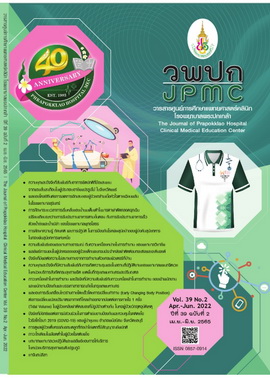Hyponatremia in Cirrhosis
Main Article Content
Abstract
Hyponatremia in cirrhosis is an unusual condition in general practice. However, it is frequently seen in advanced cirrhosis that makes its management more complicated. Hypervolemic hyponatremia is the most common type, especially in decompensated cirrhosis. The management in this setting depends on the severity of hyponatremia. They are composed of fluid restriction, diuretic cessation, hypokalemia correction, intravenous albumin infusion, arginine vasopressin receptor antagonist, hypertonic saline, and monitoring of the increased rate of serum sodium for preventing complications.
Article Details

This work is licensed under a Creative Commons Attribution-NonCommercial-NoDerivatives 4.0 International License.
References
European Association for the Study of the Liver. EASL clinical practice guidelines for the management of patients with decompensated cirrhosis. J Hepatol 2018;69:406-60.
Biggins SW, Angeli P, Garcia-Tsao G, Ginès P, Ling SC, Nadim MK, et al. Diagnosis, evaluation, and management of ascites, spontaneous bacterial peritonitis and hepatorenal syndrome: 2021 practice guidance by the American Association for the Study of Liver Diseases. Hepatology 2021;74:1014-48.
Angeli P, Wong F, Watson H, Ginès P. Hyponatremia in cirrhosis: results of a patient population survey. Hepatology 2006;44:1535-42.
Bernardi M, Zaccherini G. Approach and management of dysnatremias in cirrhosis. Hepatol Int 2018;12:487-99.
Alukal JJ, John S, Thuluvath PJ. Hyponatremia in cirrhosis: an update. Am J Gastroenterol 2020;115:1775-85.
Kim WR, Biggins SW, Kremers WK, Wiesner RH, Kamath PS, Benson JT, et al. Hyponatremia and mortality among patients on the liver-transplant waiting list. N Engl J Med 2008;359:1018-26.
Londoño MC, Cárdenas A, Guevara M, Quintó L, de Las Heras D, Navasa M, et al. MELD score and serum sodium in the prediction of survival of patients with cirrhosis awaiting liver transplantation. Gut 2007;56:1283-90.
Pereira G, Baldin C, Piedade J, Reis V, Valdeolivas T, Victor L, et al. Combination and sequential evaluation of acute-on-chronic liver failure (ACLF) and hyponatremia and prognosis in cirrhotic patients. Dig Liver Dis 2020;52:91-7.
Guevara M, Baccaro ME, Torre A, Gómez-Ansón B, Ríos J, Torres F, et al. Hyponatremia is a risk factor of hepatic encephalopathy in patients with cirrhosis: a prospective study with time-dependent analysis. Am J Gastroenterol 2009;104:1382-9.
Leise M, Cárdenas A. Hyponatremia in cirrhosis: implications for liver transplantation. Liver Transpl 2018;24:1612-21.
Leise MD, Yun BC, Larson JJ, Benson JT, Yang JD, Therneau TM, et al. Effect of the pretransplant serum sodium concentration on outcomes following liver transplantation. Liver Transpl 2014;20:687-97.
Carvalho JR, Machado MV. New insights about albumin and liver disease. Ann Hepatol 2018;17:547-60.
Bajaj JS, Tandon P, OʼLeary JG, Biggins SW, Wong F, Kamath PS, et al. The impact of albumin use on resolution of hyponatremia in hospitalized patients with cirrhosis. Am J Gastroenterol [Internet]. 2018[cited 2020 Sep 9]; 113(9):1339. Available from: https://journals.lww.com/ajg/Abstract/2018/09000/The_Impact_of_Albumin_Use_on_Resolution_of.16.aspx
Caraceni P, Riggio O, Angeli P, Alessandria C, Neri S, Foschi FG, et al. Long-term albumin administration in decompensated cirrhosis (ANSWER): an open-label randomised trial. Lancet 2018;391:2417-29.
Berl T, Quittnat-Pelletier F, Verbalis JG, Schrier RW, Bichet DG, Ouyang J, et al. Oral tolvaptan is safe and effective in chronic hyponatremia. J Am Soc Nephrol 2010;21:705-12.
Cárdenas A, Ginès P, Marotta P, Czerwiec F, Oyuang J, Guevara M, et al. Tolvaptan, an oral vasopressin antagonist, in the treatment of hyponatremia in cirrhosis. J Hepatol 2012;56:571-8.

